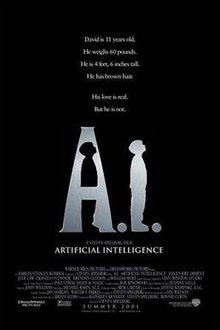In Mary Shelley's Frankenstein, one of the central themes is the idea that science can lead to harmful results. This is presented through the hypothetical production of a being much more intelligent and much closer to human than the creator expected. This 'creature' (referred to as Pedro for brevity) attempts to understand the world, but is often misunderstood, even by his own creator.
(But we've talked about this in class, so I'll try not to reiterate our discussions.)
This situation reminded me of a similar type of symbolic narrative in sci-fi.
Some of you may be familiar with the movie A.I.; if you're not, I'd recommend skimming [[the story on which it is based]] or at least [[a synopsis]]. (And even if you are, the story is worth checking out!)
To review, the movie's premise is fairly simple: a couple's child goes into a coma as the result of a rare disease, and after much soul-searching, they decide to adopt a prototype 'imprinting' AI, which is programmed to feel emotion in much the same way as a human. This boy, David, lives happily with his 'mother', Monica, and 'father', Henry, until their real son, Martin, is cured; after various conflicts, he is abandoned by his family because Monica can't bring herself to send him to be dismantled.
From this point in the movie, he experiences many forms of discrimination; he is threatened with destruction at an anti-robot Flesh Fair, for instance. He attempts to find the 'Blue Fairy', inspired by the story of Pinocchio, in order to become a real boy. However-- (plot twist!)-- he ends up being buried deep in the ocean for several thousand years.
He is revived by highly advanced automatons after the human race has died out. In an attempt to discover more about the race that created their precursors, these robots ask him various questions and observe his interactions with a revived Monica; unfortunately, their technology can only revive humans for one day. The end of the movie sees David and the clone going to sleep, or, as David puts it, "that place where dreams are born."
Aside from the entire movie's tear-jerking attributes, there is quite a bit of deeper meaning.
I immediately saw several parallels to Frankenstein. Like Pedro, David is much more advanced and human than his creators might have expected-- indeed, even the robots without the emotional programming are portrayed as more caring and 'human' than the majority of humans. Both David and Pedro are abandoned by their creators and face persecution because of their lack of knowledge about the world. The audience sympathizes much more with David than with his creators, and I have to admit I'm becoming more sympathetic towards Pedro.
The purpose of both stories also appears to be cautionary. The eerily-human creations show that we have to be prepared to take responsibility for our explorations. Bioethics and roboethics are emerging fields, and professional advice often urges careful and slow development in ethically-dubious research.
I think these messages are important to consider, no matter what you think about research and development in artificial intelligence or other controversial fields. Interestingly enough, we are already seeing parallels to parts of these stories in the real world.

This story seems very interesting, and I also noticed the similarity that David had to the creature in Frankenstein (I feel that calling him Pedro is slightly inappropriate.)
ReplyDeleteBut think about this: David and the creature were both originally created by humans. If humans can't even treat themselves with respect, how could anyone expect us to treat our creations with respect? I think the moral of the story is that most humans are just the epitome of irresponsiblity and there is nothing that we can do about it.